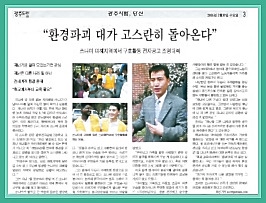Media Reports
The Gwangju Dream, Korea, March 30, 2005
Environmental Destruction Brings
Retribution
Mr. Jo Myung-Dae of a Technical High School Conducts Relief Activities in Tsunami Affected Areas
People
only interested in how much donation money collected
***
Disasters—a global environmental issue, not a foreign affair
***
“We need education in schools about disasters.”—Jo
Myung-Dae

Mr. Jo and other relief team members render aid in
a tsunami-ravaged district of Sri Lanka.
(Originally in Korean)
In December 2004, a massive tsunami devastated South Asia, resulting in hundreds of thousands of dead and missing. Then, on March 28, 2005, even before its victims were able to recover, an 8.7 magnitude earthquake in the Indian Ocean off the coast of Sumatra lead residents of Indonesia, Sri Lanka, India, Malaysia, Thailand and other countries to fear another tidal wave.
Upon hearing about the quake, Jo Myung-Dae (38), an instructor at the Gwangju Electronics Industrial High School, said, “The recent disasters are not simply environmental catastrophes but retribution for ignoring life and destroying the natural world for the sake of economic development. It’s a pity. I can’t go there right away. It reminds me of the hopeless situation of the tsunami affected areas last year.”
From mid-January to mid-February 2005, Mr. Jo engaged in relief activities in tsunami ravaged regions of Sri Lanka including Matara, about which he said, “The houses were gone without any trace and I saw people sitting in their home sites with absentminded looks. Debris was mixed and piled up like mountains so that people could dare not think of cleaning up.”
Mr. Jo has been a member of The Supreme Master Ching Hai International Association for approximately ten years. Members of The Association conduct worldwide relief and charitable activities while seeking a spiritually fulfilled life through meditation rather than through the acquisition of material wealth. Thus, after the tsunami struck, he joined a relief team consisting of thirty-one Korean members that went to Matara to serve the victims. As head of the team, Mr. Jo provided people in the affected regions with daily necessities and led the volunteers. Regarding the team’s work, he said, “I thought helping those who had lost family members to recover from their mental shock was the most important thing; I mean the healing of the mind. So we prepared special programs for the local children and also rented heavy machinery and cleaned up the massive accumulations of trash with our members day and night. Thus the children became happy and the villagers began to recover from their previous outlook and have vitality in their faces. The locals are by nature very innocent and pure so they regained strength quickly.”
After returning to Korea, Mr. Jo visited the Gwangju Foreign Laborers’ Center, met with Sri Lankan workers and informed them of their families’ situation in their hometown of Matara. “When we see news reports about disasters, they only talk about how much money was collected for donations. Then people easily forget about the disasters. But when we came to Sri Lanka three weeks after the tsunami had struck, nothing had changed,” said Mr. Jo. He then emphasized, “We should look at disasters as global environment problems, not just overseas affairs.”
In his teaching, Mr. Jo stresses with students the purposes for which technology should be used. He is also interested in developing automobiles that use clean energy, and is pursuing environmental studies at Green University in Hamyang-gun, Kyungsangnam-do.
In conclusion, Mr. Jo said, “Schools do not provide adequate environmental education. We should teach our children to be interested in environmental problems in daily life. If we abuse nature, the results will definitely come back to haunt us.” Mr. Jo added that through the recent South Asian Tsunami, we can learn about the essence of the problems humanity faces. (Reporter Jo Sun)

| Media
Reports |
|
| Man’s Best Friend Saves an Abandoned Baby in Kenya | |